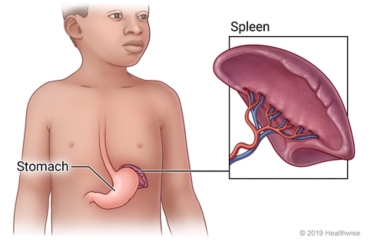Splenectomy in Children: Before Your Child's Surgery
What is a splenectomy?

A splenectomy (say "splih-NEK-tuh-mee") is surgery to take out the
spleen. The spleen is an organ in the upper left side of the belly.
It filters old and damaged blood cells from the blood. The spleen
may need to be removed if it doesn't work well because of an
infection like pneumonia. Sometimes it's removed because it was
damaged in an accident or injury.
Your child will be asleep during the surgery. The surgery may be
done through one large cut (incision). This is called open surgery.
Or your child may have laparoscopic surgery. To do this, the doctor
puts a lighted tube, or scope, and other tools through several small
cuts.
Open surgery will leave a scar on your child's belly. Laparoscopic
surgery leaves small scars. They will fade over time.
The spleen helps protect your child from illness. After the spleen
is gone, your child may be more likely to get infections such as
pneumonia and meningitis. So before or soon after surgery, your
child may need one or more vaccinations.
Your child may need to take antibiotics for a while after surgery.
Your child may also need to take them each time your child has a
fever. This could be a sign of a serious infection. Ask the doctor
what to do if your child has a fever.
How do you prepare for surgery?
Surgery can be stressful for both your child and you. This
information will help you understand what you can expect. And it
will help you safely prepare for your child's surgery.

Preparing for surgery
|
|
|
|
|
|
|
|
-
Tell the doctor ALL the medicines, vitamins, supplements,
and herbal remedies your child takes. Some may increase
the risk of problems during the surgery. Your doctor will
tell you if your child should stop taking any of them
before the surgery and how soon to do it.
|
|
|
|
|
|
|
|
|
|
The day before surgery
What happens on the day of surgery?
-
Follow the instructions exactly about when your child should stop
eating and drinking. If you don't, your child's surgery may be
canceled. If your doctor told you to have your child take any
medicines on the day of surgery, have your child take them with
only a sip of water.
-
Follow the doctor's instructions about when your child should
bathe or shower before the procedure. Do not apply lotion or
deodorant.
-
Your child may brush their teeth. But tell your child not to
swallow any toothpaste or water.
-
Do not let your child wear contact lenses. Bring your child's
glasses or contact lens case.
-
Be sure your child has something that's a reminder of home. A
special stuffed animal, toy, or blanket may be comforting. For an
older child, it might be a book or music.
At the hospital or surgery center
-
A parent or legal guardian must accompany your child.
-
Your child will be kept comfortable and safe by the anesthesia
provider. Your child will be asleep during the surgery.
-
Your child may have a tube in his or her nose that goes down the
back of the throat into the stomach. This is called a nasogastric
tube. It removes stomach fluids for the first few days after the
surgery.
-
The surgery will take about 2 to 4 hours.
-
After surgery, your child will be taken to the recovery room. As
your child wakes up, the recovery staff will monitor your child's
condition. The doctor will talk to you about the surgery.
-
Your child may need to stay in the hospital for 2 to 3 days. Your
child is ready to go home when his or her pain is under control
and your child can eat and drink normally.
When should you call your doctor?
Current as of: July 26, 2023
Content Version: 14.0
Care instructions adapted under license by your healthcare
professional. If you have questions about a medical condition or
this instruction, always ask your healthcare professional.
Healthwise, Incorporated disclaims any warranty or liability for
your use of this information.